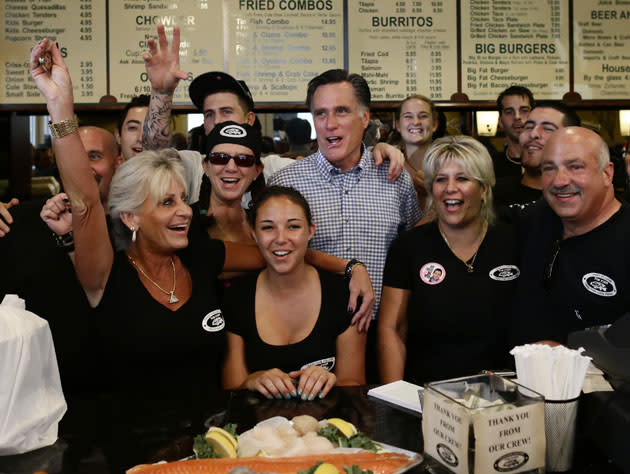 The Ticket
The TicketWith Election Day in sight, Romney shows a softer side to voters

PORT ST. LUCIE, Fla.—Mitt Romney has never been a touchy-feely kind of politician, a candidate willing to talk intimately about his personal life and past experiences as a way to connect with voters.
But with less than a month to go before Election Day, Romney has apparently made the calculation that he cannot win the presidency without opening up about his private world and proving to voters he's not the emotionally distant man Democrats have painted him to be.
Touring this key battleground state over the weekend, the GOP nominee debuted a retooled stump speech featuring poignant anecdotes about the people he's met on the campaign trail and those he's helped personally. They were stories the public has likely read or heard about before—including a tale of Romney's generosity to a dying 14-year-old boy as told by members of his Mormon church onstage at the Republican National Convention.
The difference this time was that Romney himself was speaking of his charitable deeds and how he had sought to offer comfort to the sick. According to aides, it was a glimpse of the "real Mitt" that the candidate's wife, Ann, and other close family and friends have long complained has been absent from coverage of the campaign trail.
Beginning with a Friday night rally in St. Petersburg, Romney spoke in highly personal terms of encounters with people who had proven to him "the greatness of the human spirit in my fellow Americans."
The most powerful of the stories was the candidate's relationship with David Oparowski, a 14-year-old Massachusetts boy and member of Romney's church who was dying of leukemia when he asked Romney to help draft his final will. Oparowski's parents told the boy's story ahead of Romney's nomination speech at the RNC in August, but this weekend was the first time Romney shared the story himself, telling audiences how much he genuinely "loved" the boy and did things to make him happy in his final days, including putting on an impromptu fireworks show.

"It was clear he was not going to make it," Romney relayed to a once-boisterous crowd that had gone silent. "I went into his room one night when he was in bed, and he asked me a very difficult question. He said, 'Mitt, what's next?' He called me 'Brother Romney.' 'What's next?' And I talked to him about what I believe is next."
A few days later, Romney told the crowd, Oparowski summoned him to his bedside to draft a final will. The boy had remembered that Romney had a degree from Harvard Law School.
"I went to David's bedside and got a piece of legal paper, made it look very official," Romney said. "And then David proceeded to tell me what he wanted to give his friends. Talked about his fishing rod, and who would get that. He talked about his skateboard, who'd get that. And his rifle, that went to his brother. I've seen the character of a young man like David, who wasn't emotional or crying. He had his eyes wide open. There's a saying: 'Clear eyes, full heart, can't lose.' David couldn't lose. I loved that young man."
Romney also spoke of Billy Hulse, a college classmate who had lived his life as a quadriplegic after suffering an accident many years ago. The GOP candidate told supporters he had seen his former classmate just a few weeks ago at a campaign event in Atlanta.
"It's not easy for Billy to get around [as a] quadriplegic. But his wife was there and he can't move, of course, his arms and his legs, and he can barely speak. And they brought him forward, a big crowd around him," Romney recalled. "I reached down and I put my hand on Billy's shoulder and I whispered into his ear, and I said, 'Billy, God bless you, I love ya.' And he whispered right back to me—and I couldn't quite hear what he said. He tried to speak loud enough for me to hear."
After a pause, Romney said, "He died the next day."
Repeating the story here at a town square in Port St. Lucie on Sunday, Romney affected many in the hushed crowd, with people responding differently. Some of the few thousand let out a sympathetic "Ohhh" in unison. But others seemed caught off guard by the sudden dark turn of Romney's story. "OHH!" one woman said, shooting a glance at her husband.
Romney's efforts to get personal were a stark difference for a candidate who has been deeply uncomfortable at times on the campaign trail when he's tried to connect with voters. It's an awkwardness that has hurt his bid for the presidency and allowed his Democratic opponents to define him as an aloof and uncaring rich guy who can't understand the struggles of average Americans.
During the primaries and for most of the general election, the Republican presidential nominee declined to respond to attacks calling attention to his personal wealth—in part because he was "embarrassed" and didn't like talking about money even with those closest to him, a Romney friend told Yahoo News.
It was a decision that damaged his standing with voters. A recent Reuters poll found Romney trailing President Barack Obama by 30 points on the question of which candidate voters like the best—a result that has been reflected in other polls for months.
But Romney aides believe last week's debate may offer a turning point for their candidate. After months of coming off as awkward and stiff at times on the stump, Romney was confident and commanding—but, perhaps most importantly, at ease as he faced off with his Democratic rival.
In a snap poll conducted after the event, CBS News found 63 percent of those surveyed believed Romney cared about their needs—a 33-point jump in polling conducted before the debate.
A senior Romney aide insisted the candidate had decided on his own to begin incorporating more personal stories into his stump speech. But as he did, Romney offered a little bit of spin to the transition—suggesting he's been the same guy all along, but it hasn't come through because of the media and its focus on "sound bites."
At rallies all over the state, Romney and his wife, Ann, praised last week's debate because it allowed the candidate to speak "unfiltered."
"I was so thrilled at the debate for people to see my husband unfiltered, without any negative ads, without any media trying to interpret what he says and what he feels in his heart," Ann Romney told supporters in St. Petersburg. "This is a man who cares about the American people. I've seen him throughout his life exhibit extraordinary compassion for others."

